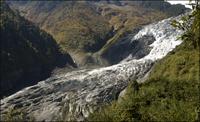There is a reason that people in Tibet consider their glaciers sacred. These vast (but contracting) fields of ice help moderate the climate on planet earth, just as they even out the river flows in one of the hottest, thirstiest regions in the world.
As we have reported before, however, the effects of global warming are being felt most severely in polar regions and on the Tibetan plateau. Where global average temperatures are shifting moderately close to the equator, the average temperature has risen by more than two degrees in the last 20 years at the foot of the Mingyong glacier. As a result, the rate of glacial retreat is no longer glacial. It’s doubled to the point that it retreats at more than 150 feet per year, and the glacier as a whole is believed to have shrunk by 25 per cent in 13 years.
That means less snow to reflect heat away from the earth, which redoubles the effect of global warming. It also means less water available in the hot summer – a serious consideration when 10 per cent of the world’s population lives downstream from the Tibetan mountains.
Some of the resistant politicians who walked away from Bali this week earned praise for “pragmatism” – for “telling it like it is” – when they suggested that the Kyoto fans are asking for too much in their zeal to establish early and firm emission targets. These are people who would cut insurance payments out of a tight budget, on the grounds that their cars might not crash and their houses might not burn down. But as sacred glaciers melt toward nothing, that pragmatism is looking more and more like selfishness – like recklessness – like shortsighted stupidity.
Subscribe to our newsletter
Stay up to date with DeSmog news and alerts






